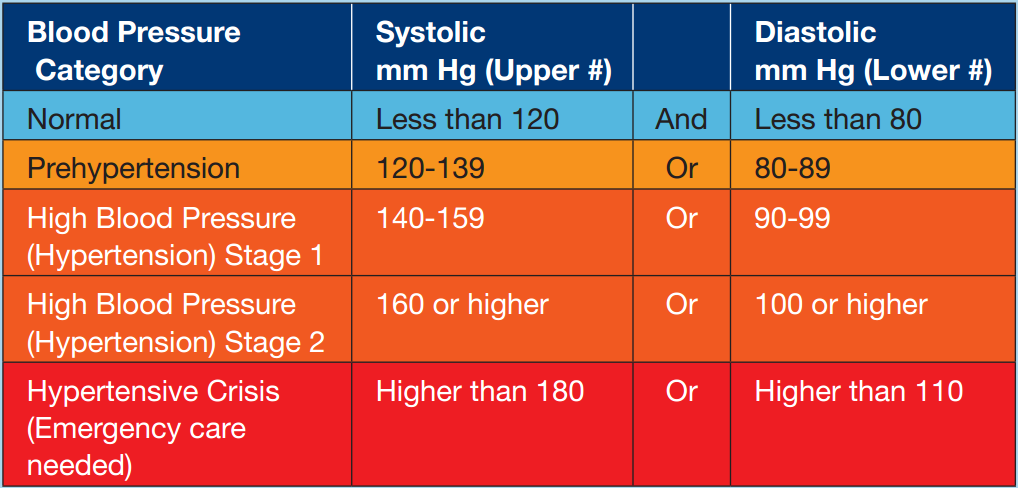What is Blood Pressure?
When your heart pumps blood through the blood vessels, the blood pushes against the walls of your blood vessels. This creates blood pressure. Your body needs blood pressure to move the blood throughout your body, so every part of your body can get the oxygen it needs.
The table below shows healthy and unhealthy blood pressure ranges as recognized by the American Heart Association.

Causes of high blood pressure
In most cases, the cause of high blood pressure is not known. However, there are known risk factors for high blood pressure.
Risk factors that are outside of your control
Family history: If your parents or other close blood relatives have high blood pressure, there’s an increased chance that you’ll get it, too.
Age: The older you are, the more likely you are to get high blood pressure.
Gender: Until age 54, men are more likely to get high blood pressure than women are. But that changes as we age. From age 55 to 64, men and women get high blood pressure at similar rates. And at 65 and older, women are more likely to get high blood pressure than men are.
Race: African Americans tend to develop high blood pressure more often than Caucasians.
Risk factors that you can control
- Lack of physical activity
- An unhealthy diet, especially one high in sodium.
- Overweight and obesity.
- Drinking too much alcohol.
- Smoking and tobacco use
- Stress.
- Sleep apnea
How high blood pressure affects the body
Untreated high blood pressure can lead to coronary heart disease, heart failure, heart attack, stroke, kidney damage, angina (chest pain related to heart disease), peripheral artery disease, and other serious conditions.
Monitoring, treating, and managing high blood pressure
If you’ve been diagnosed with high blood pressure, it’s very important to follow the treatment plan your healthcare provider gives you.
Eating healthy
For people with high blood pressure (and those at risk for it), a healthy diet is a must. There are many healthy diet plans available, but the best for high blood pressure include limiting sodium (salt) intake and including a variety of nutritious foods.
As for sodium, you’ll want to limit your intake to no more than 1,500 mg per day, which is associated with the greatest reduction in blood pressure. How can you tell how much sodium you’re eating? By reading food labels. Be careful when you do so—many foods that don’t seem to be salt-heavy may contain “hidden” sodium, especially canned foods. Fortunately, food labels give an accurate picture of how much you’ll ingest by eating that particular product.
Physical activity
Physical activity is great for everyone. The health benefts of being active are many, and among them are proven benefts to your heart and circulatory system. In addition to traditional forms of exercise, healthy physical activity can include:
- Parking farther away from your destination to walk a bit more
- Taking the stairs instead of the elevator
- Taking your dog out for a stroll
- Walking instead of driving
To get the greatest benefits from physical activity, the American Heart Association recommends:
- Aim for 3 to 4 40-minute sessions per week of moderate-to-vigorous intensity
- physical activity
- Getting at least 10 minutes of physical activity per episode
It’s a good idea to check with your healthcare provider before beginning a physical activity program.
Maintaining a healthy weight
If you are overweight or obese, your healthcare provider can gauge how much weight you need to lose by determining your body mass index (BMI). BMI is determined by assigning a numerical value to your weight in relation to your height.
There’s good news here, too. Even losing 3% to 5% of your body weight can bring good health benefts, such as reducing the workload on your heart. Talk with your healthcare provider about the best way to lose weight. The safest way to lose weight is typically to do so a few pounds at a time, by making changes to how many calories you eat and how much physical activity you get. By reducing calories and increasing your physical activity, you’re on your way to a healthier weight.
Reducing stress
Researchers continue to study how stress affects our health, and while we don’t know exactly how stress impacts high blood pressure, we do know that it has an effect. While stress is unavoidable, it can be managed effectively. There are some simple things you can do to reduce the amount of stress you have to deal with. These include:
- Giving yourself time to get things done.
- Not over promising what you can do.
- Understanding your stress triggers.
- Planning to address what you can change, and accepting what you can’t change.
- Taking time to relax.
- Building relationships with people who care about you.
- Taking care of yourself.
Limit (or avoid) alcohol
Drinking too much alcohol raises your blood pressure and is a risk factor for many other serious health conditions.
Avoid or quit tobacco
It’s simple: Tobacco is terrible for your health. It is a known risk factor for many potentially deadly diseases, including cancer, heart disease, and lung disease, among many other conditions. If you don’t smoke, don’t start. If you do smoke, talk with your healthcare provider about ways you can begin to quit.
Home blood pressure monitoring
One way to stay on top of how you’re doing in managing your high blood pressure is to use a home blood pressure monitor. This can be a very important tool for you and your healthcare provider to use in getting a “broader” picture of how well you’re controlling your high blood pressure.
Medications
Take medications exactly as prescribed
Your medications are designed to reduce your blood pressure to a healthy range, but they can only work if they’re taken exactly as prescribed. This means following the dosage instructions on your medicine bottle to the letter. If you are unsure about how to take your medication, talk with your healthcare provider or pharmacist.
Again, do not stop taking your medication unless you’re instructed to do so by your healthcare provider.
Resources:
[1] American Heart Association/American Stroke Association. Understanding and Managing High Blood Pressure. http://www.heart.org/idc/groups/heart-public/@wcm/@hcm/documents/downloadable/ucm_461840.pdf, 2014/2017-8-30.
Version: D-0141-1708-V1.0

